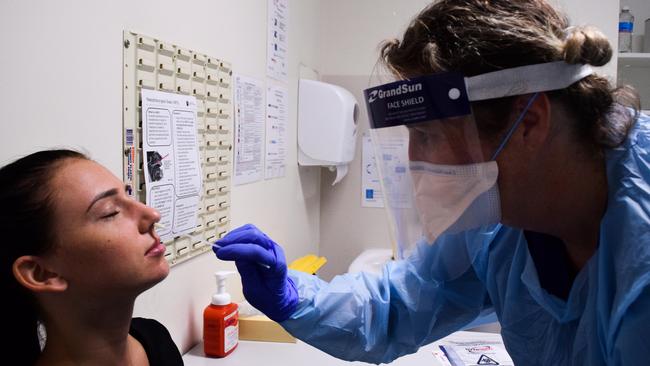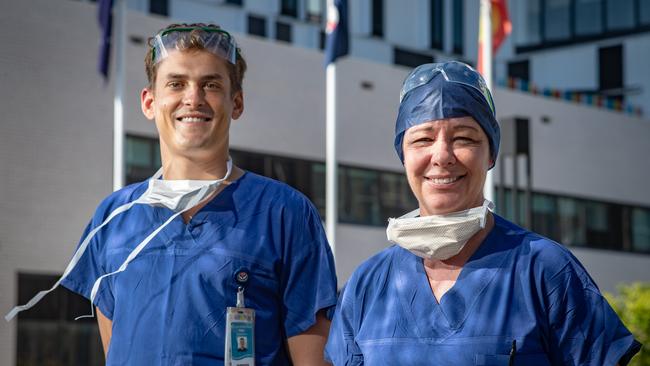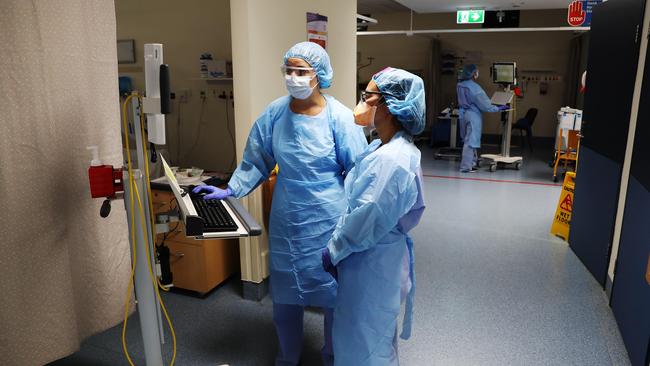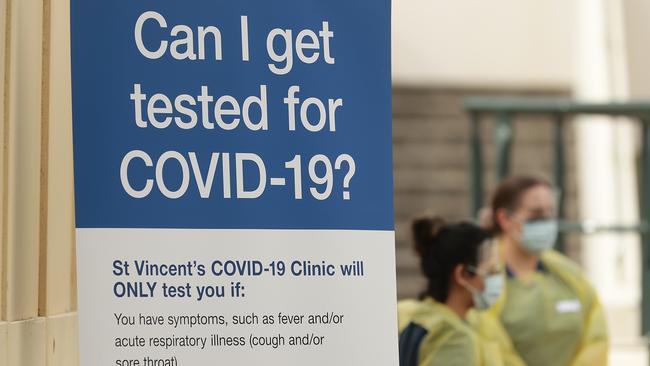So you’ve contracted COVID-19, what happens next?
You’ve been through the process of getting tested and have been diagnosed with COVID-19 — what then? How will you be treated? How long will recovery take? Here’s what to expect.

NSW
Don't miss out on the headlines from NSW. Followed categories will be added to My News.
With authorities hoping stricter social isolation measures will help flatten the curve, the behaviour of people who contract COVID-19 is now crucial to prevent community transmissions and intensive care units becoming overwhelmed.
For most people, if your GP recommends you are tested for COVID-19 and the results are positive, this is what will happen next.
WHO WILL TREAT YOU
Australian Medical Association NSW Vice President Dr Danielle McMullen said depending on your severity of illness you will be treated in different ways.
“If your illness is mild, it’s likely you’ll be treated at home with ongoing (telehealth) monitoring by your GP or a hospital team,” she said.
“If you’re more severely unwell, you will be admitted to hospital for care.”

YOU MUST SELF-ISOLATE
If you are well enough to be managed at home, you must self-isolate until your GP or the public health unit advises that you no longer need to be in isolation.
Until then, you can only leave your home to seek medical care or because of an emergency.
People flouting isolation or quarantine orders face fines of up to $11,000 or six months’ in prison if they leave the home without a reasonable excuse.
A NSW Police spokesperson said police were enforcing all ministerial directions including the self isolation of people diagnosed with COVID-19.

You cannot go to work, school, childcare, university, attend recreation facilities, or public areas, or go shopping and you cannot have visits from people who do not have an essential need to be in the home.
Separate yourself from the other people in your house and wear a surgical mask when you are in the same room or using common areas as another person or visiting a healthcare provider.
Ask family or friends to pick up your groceries and medicines for you or order online.
Pharmacists can give medicines without a prescription and can now stay open 24/7. More details are available here
You can use this form to help the government track the spread of the virus.
MONITOR YOUR SYMPTOMS
Dr McMullen said the main symptom to monitor in positive COVID cases are shortness of breath and breathing difficulties. If you test positive, your treating doctor will give you more specific information about how to monitor your symptoms.
If your symptoms worsen but are not serious, contact your GP or the public health unit on 1300 066 055.
Your GP or hospital doctor will be able to communicate with you remotely.
“Obviously, if you become suddenly more unwell, you should seek assistance, according to the instructions given to you when you got your positive result,” Dr McMullen said

HOSPITAL IN THE HOME
Dr McMullen said people with mild illness, similar to a normal cold, will likely be sent home for self-isolation and monitored from there.
There is also an is an outreach service providing clinical care to a patient in their home that is comparable to the care they’d get in hospital called Hospital in the Home (HITH).
Your treating doctor will advise you if this care is for you.
A NSW Health spokesperson said the HITH service lets patients reduce the length of time they stay in hospital and, in some instances, avoid admission altogether.
A range of clinical conditions can be effectively and safely managed without a person
needing to stay in hospital, she said.
“Providing this option for patients who can suitably be treated in HITH saves the
patient an unnecessary stay in hospital and frees up beds for patients who need to
be in our hospitals for their care,” the spokesperson said.

HOW LONG IS THE RECOVERY
Dr McMullen said the current advice is that people (other than healthcare workers) are assumed to have recovered after 10 days of illness, or three days after symptoms resolve, whichever is later.
“This advice may change and so it’s important to follow the specific isolation advice given to you by public health officers when you test positive,” she said.
“As we know, in most people COVID-19 is a mild illness. So, yes, we anticipate that most people will be able to recover from home with appropriate monitoring.”
HOSPITALISATION
If your symptoms become serious including if you have shortness of breath at rest or difficulty breathing, call triple-0. Tell the ambulance staff you have COVID-19.
At midday on Thursday, there were 231 COVID-19 cases being treated by NSW Health, including 43 cases in intensive care units, of those, 20 required ventilators.
More than 50 per cent of cases being treated by NSW Health were through Hospital in the Home services.

DON’T IGNORE SYMPTOMS
If you think you have symptoms, call your GP and arrange a test. Do not just turn up at a surgery or emergency department. Find out how to get tested here.
Signs you may be ill can be checked on NSW Health coronavirus symptom checker here.
The AMA says infected patients were putting the lives of doctors, health care workers and patients at risk by seeking treatment for other ailments while “hiding” their coronavirus symptoms.
“There have been some disturbing incidents of people hiding their symptoms in order to get treatment for other health issues,” AMA NSW President Dr Kean- Seng Lim said on Monday.
Dr Lim said health workers had to limit scarce supplies of protective equipment to treat symptomatic cases.
“We know doctors in other countries have already died as a result of coronavirus. Fatalities and high numbers of health care worker infections would further strain the health system’s ability to respond to this pandemic,” Dr Lim warned.
`
IF YOU NEED SUPPORT IN ISOLATION:
Lifeline Australia: 13 11 14
Kids Helpline: 1800 551800
NSW Mental Health Line: 1800 011 511
National coronavirus Health Information line: 1800 020 080
Originally published as So you’ve contracted COVID-19, what happens next?
